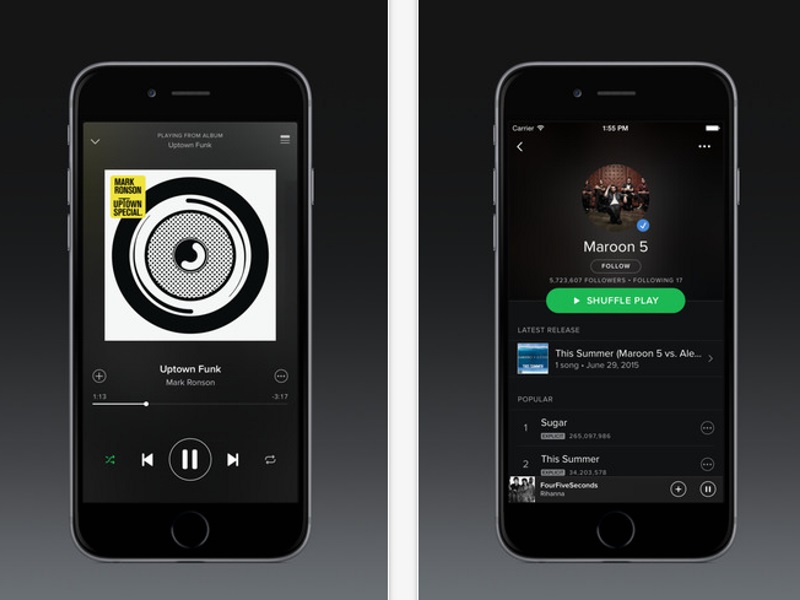- Home
- Apps
- Apps Features
- Spotify Might Be Secretly Stealing Your Taste in Music and Pitching It to Other People
Spotify Might Be Secretly Stealing Your Taste in Music - and Pitching It to Other People

In a new initiative launched by Spotify, the streaming music platform will publish genre-specific playlists made-up of unknown artists every Wednesday. What's different about these lists is that they are based on the musical tastes of a select population of cutting-edge bloggers, reviewers and fans. Rather than relying on hand-picked collections from industry insiders - such as those working at Apple Music or Google Play - Spotify's Fresh Finds attempts to offer a more democratic path to music discovery.
To create these fresh playlists, Spotify said it uses software that crawls the web identifying buzzy bands, primarily from diehard music blogs, reviews and forums. It matches these artists against its own database and identifies the users who are already onto them. Spotify then develops a list of 50,000 tastemakers and watches them to see what other artists they are listening to. The weekly Fresh Finds playlist is culled from these trendy users, with the final mix whittled down by a group of Spotify editors. The result is a mix of deep underground cuts that tries to challenge listeners to expand their music taste.
It's a different approach to one of the central problems of the current model of streaming music platforms: how to wade through endless choices and find new artists. So far, this debate has been framed as one of man versus machine.
Pandora has relied almost entirely on algorithms, building out a complex categorization system for their music and hobbling together the characteristics of your previous listens to recommend new tracks. Spotify too has traditionally leaned on its user data, populating its weekly Discover playlists with songs that other users with similar taste as you tend to like. Both platforms still employ the human touch - Pandora pays musicians to break down and categorize hours of music and Spotify has its own music editors.
But competitors Apple Music and Google Play have taken the human-first approach to heart. Both platforms hired music editorial directors from Pitchfork and filled curator positions with critics and editors. Apple Music often promotes its artist or influencer playlists, a nod to their belief that traditional insiders will lead to the best new discoveries. Trent Reznor, former Nine Inch Nails frontman and Apple Music contributor, told Pitchfork that the platform stood apart because of this: "Ultimate mixtapes by people who know how to make them. You can sense the quality."
But Spotify's Fresh Finds model seems to suggest that the algorithm's power lies in unlocking a wider swath of voices. Their method of mining music websites for the hippest artists gives them a crowdsourced, bird's-eye-view of the trends. "It's as if we're sitting on top of the world of the music web and seeing what's trending right now," said Brian Whitman, Principal Scientist at Spotify and one of the guys behind Fresh Finds technology. "Obviously you can't listen to millions of new songs in a week. But you can listen to these playlists. I feel more tapped into the new kinds of sounds that people are making, especially on the electronic and experimental end." And it's highly scaleable, allowing them to cast a massive net. That job of listening to all that new music? Spotify's computers are watching the people who are already doing it for them.
Matt Cohen, Arts Editor for alt-weekly Washington City Paper and music critic, isn't sold on this idea. He worries about Spotify's passive method of music discovery. "It benefits to know where the music is coming from," he said of more traditional methods such as scouring blogs or reading trusted critics. "Music is at its essence a medium to connect, and not knowing who the user [recommending the music] is just makes me uncomfortable. Finding critics whose tastes align with me, that's the chief way that I find new music. It's a huge part of enjoying music. No explanation of why they're listening to this artist, no criticism. . .that just seems off to me."
Spencer Kornhaber, music critic for The Atlantic, is more positive. He mentions it's often hard to tell whether pre-made playlists on Tidal, Apple or Spotify are "cutting through the industry hype or amplifying it" - and the result is a lot of music that tends to sound the same. It's one reason he's excited by Spotify Fresh Find's more democratic approach."It's cool that Spotify's crowdsourcing technique will reflect real people's actual listening habits. They're capturing something organic. . .and that is interesting," he said. "When you have a human creating a playlist, they are creating something that reflects themselves. There is an interest in performing. You are curating something that people want, but it reflects back on the user. So in a weird way, there's something almost more authentic in an algorithm."
And what about the traditional role of music critic, DJ or curator as gatekeepers between new artists and listeners? Are they threatened by Spotify's method of pooling anonymous users, many of them probably critics themselves, to make recommendations? After all, making playlists for Apple or Google is one way that such professionals are making money today. The Wall Street Journal reported that music critics and editors can get paid a couple hundred a playlist by streaming platforms, and that many of these same critics are building up large followings for their mixes on Spotify, where they provide this service for free. Of course, there are also many amateur playlist makers with huge followings as well. Whitman, Principal Scientist at Spotify, is quick to point out that Spotify still employs music editors for the human touch, and will continue to do so. "This is just our first chance to be able to tap into the world of music criticism and make a cool product out of it."
For now, Fresh Finds seems like yet another example of tech's trend towards user-as-product. Indeed, the next big artist could be discovered by you.
© 2016 The Washington Post
For details of the latest launches and news from Samsung, Xiaomi, Realme, OnePlus, Oppo and other companies at the Mobile World Congress in Barcelona, visit our MWC 2026 hub.
Related Stories
- Samsung Galaxy Unpacked 2026
- iPhone 17 Pro Max
- ChatGPT
- iOS 26
- Laptop Under 50000
- Smartwatch Under 10000
- Apple Vision Pro
- Oneplus 12
- OnePlus Nord CE 3 Lite 5G
- iPhone 13
- Xiaomi 14 Pro
- Oppo Find N3
- Tecno Spark Go (2023)
- Realme V30
- Best Phones Under 25000
- Samsung Galaxy S24 Series
- Cryptocurrency
- iQoo 12
- Samsung Galaxy S24 Ultra
- Giottus
- Samsung Galaxy Z Flip 5
- Apple 'Scary Fast'
- Housefull 5
- GoPro Hero 12 Black Review
- Invincible Season 2
- JioGlass
- HD Ready TV
- Latest Mobile Phones
- Compare Phones
- Nothing Phone 4a Pro
- Infinix Note 60 Ultra
- Nothing Phone 4a
- Honor 600 Lite
- Nubia Neo 5 GT
- Realme Narzo Power 5G
- Vivo X300 FE
- Tecno Pop X
- MacBook Neo
- MacBook Pro 16-Inch (M5 Max, 2026)
- Tecno Megapad 2
- Apple iPad Air 13-Inch (2026) Wi-Fi + Cellular
- Tecno Watch GT 1S
- Huawei Watch GT Runner 2
- Xiaomi QLED TV X Pro 75
- Haier H5E Series
- Asus ROG Ally
- Nintendo Switch Lite
- Haier 1.6 Ton 5 Star Inverter Split AC (HSU19G-MZAID5BN-INV)
- Haier 1.6 Ton 5 Star Inverter Split AC (HSU19G-MZAIM5BN-INV)

















